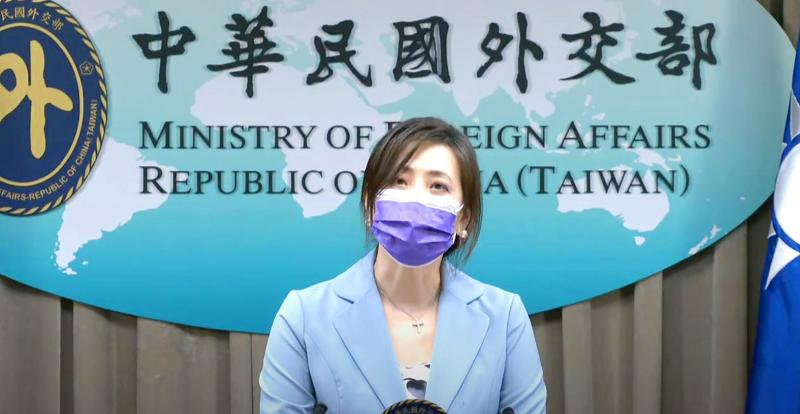The Ministry of Foreign Affairs yesterday denounced Russian President Vladimir Putin for disparaging Taiwan’s sovereignty by saying that Taiwan issues are “China’s internal affairs.”
The ministry strongly condemned Putin’s “false” remarks that “undermined the sovereignty of the Republic of China,” ministry spokeswoman Joanne Ou (歐江安) told a news briefing.
Xinhua news agency cited Putin as telling Chinese President Xi Jinping (習近平) during a telephone call on Wednesday that Russia opposed any interference from external forces in China’s internal affairs, such as in Xinjiang, Hong Kong and Taiwan.

Screengrab from the Ministry of Foreign Affair’s virtual news conference
Ou said that Taiwanese elect their government in free and fair elections, adding that only the government in Taipei can represent Taiwan.
Beijing’s irredentist claims only cause resentment among Taiwanese, she said.
In the face of Beijing’s long-term threats to Taiwan, the government and the public are determined to fight Chinese intimidation, Ou said, adding that their determination is based on the belief that “God helps those who help themselves.”
The government will continue to strengthen Taiwan’s ties with like-minded democratic nations to solicit their support, she added.
By safeguarding freedom, democracy, human rights and the rule of law, Taiwan makes significant contributions to the development and stability of the global economy, she said, calling it a powerful tool to counter China’s authoritarian expansion.
The government will keep boosting Taiwan’s self-defense and asymmetric warfare capabilities, deepening its ties with the US to safeguard a rules-based international order, and promoting peace, stability and prosperity across the Taiwan Strait and in the Indo-Pacific region, she said.
The ministry also thanked the US for reiterating that it would ensure that Taiwan has the ability to defend itself and deter aggression.
US Secretary of State Antony Blinken made the remarks in an interview with the US’ Public Broadcasting Service on Tuesday.
He said that China has over the past decade been “acting more repressively at home and more aggressively abroad,” including through actions against Taiwan, which are “potentially dangerous and destabilizing.”
He urged China to take into consideration the response that Russia’s invasion of Ukraine provoked from countries around the world.
Moreover, the US has promised Taiwan’s safety under its Taiwan Relations Act, Blinken said.
Additional reporting by CNA

Taiwan is gearing up to celebrate the New Year at events across the country, headlined by the annual countdown and Taipei 101 fireworks display at midnight. Many of the events are to be livesteamed online. See below for lineups and links: Taipei Taipei’s New Year’s Party 2026 is to begin at 7pm and run until 1am, with the theme “Sailing to the Future.” South Korean girl group KARA is headlining the concert at Taipei City Hall Plaza, with additional performances by Amber An (安心亞), Nick Chou (周湯豪), hip-hop trio Nine One One (玖壹壹), Bii (畢書盡), girl group Genblue (幻藍小熊) and more. The festivities are to

Auckland rang in 2026 with a downtown fireworks display launched from New Zealand’s tallest structure, Sky Tower, making it the first major city to greet the new year at a celebration dampened by rain, while crowds in Taipei braved the elements to watch Taipei 101’s display. South Pacific countries are the first to bid farewell to 2025. Clocks struck midnight in Auckland, with a population of 1.7 million, 18 hours before the famous ball was to drop in New York’s Times Square. The five-minute display involved 3,500 fireworks launched from the 240m Sky Tower. Smaller community events were canceled across New Zealand’s

‘IRRESPONSIBLE’: Beijing’s constant disruption of the ‘status quo’ in the Taiwan Strait has damaged peace, stability and security in the Indo-Pacific region, MOFA said The Presidential Office yesterday condemned China’s launch of another military drill around Taiwan, saying such actions are a “unilateral provocation” that destabilizes regional peace and stability. China should immediately stop the irresponsible and provocative actions, Presidential Office spokeswoman Karen Kuo (郭雅慧) said, after the Chinese People’s Liberation Army (PLA) yesterday announced the start of a new round of joint exercises around Taiwan by the army, navy and air force, which it said were approaching “from different directions.” Code-named “Justice Mission 2025,” the exercises would be conducted in the Taiwan Strait and in areas north, southwest, southeast and east of Taiwan

UNDER WAY: The contract for advanced sensor systems would be fulfilled in Florida, and is expected to be completed by June 2031, the Pentagon said Lockheed Martin has been given a contract involving foreign military sales to Taiwan to meet what Washington calls “an urgent operational need” of Taiwan’s air force, the Pentagon said on Wednesday. The contract has a ceiling value of US$328.5 million, with US$157.3 million in foreign military sales funds obligated at the time of award, the Pentagon said in a statement. “This contract provides for the procurement and delivery of 55 Infrared Search and Track Legion Enhanced Sensor Pods, processors, pod containers and processor containers required to meet the urgent operational need of the Taiwan air force,” it said. The contract’s work would be